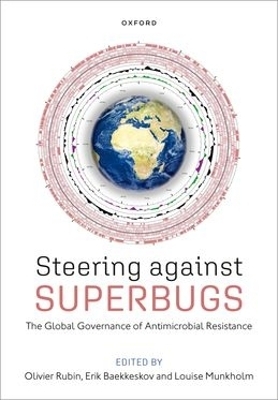
Steering Against Superbugs
Oxford University Press (Verlag)
978-0-19-289947-7 (ISBN)
Steering Against Superbugs analyses ways to reduce barriers and create opportunities for coordination. The expert contributions in this volume offer specific and original insights about what global governance of AMR means, and ways to help solve AMR issues. They show that effective governance relies crucially on pursuing local level implementation of key policies, and equitable recognition of solutions across multiple sectors within countries, and across the Global North and South.
With the COVID-19 pandemic, societies across the world have been reminded of the devastating consequences of not being able to effectively counter global health threats. AMR is arguably one of the most severe long-term threats to human, animal, and environmental health. There is momentum for global political action around novel and emerging disease threats and Steering Against Superbugs contributes with original and insightful research to inform ongoing and future debates.
Olivier Rubin is a disaster expert specializing in exploring the political and bureaucratic dynamics of slow-onset disasters such as famines, climate-induced disasters, pandemics, and antimicrobial resistance. With twenty years of experience in disaster and crisis management, Rubin has received several highly competitive multiyear grants and published widely in international outlets pertaining to crisis management, politics & public administration, and public health. Dr Rubin's recent years have been devoted to health crisis research with investigations of the global governance of antimicrobial resistance and the challenges of integrating evidence-based decision making in major health crises responses. Erik Baekkeskov is a political scientist who researches and teaches governance at the intersection of public health and crisis management. His theoretical work has particularly focused on the roles of science and experts, and the related logic of policy-making and public administration. His empirical work has focused on cases of public health threats, including the 2009 H1N1 pandemic, 2014 Ebola, 2020 COVID-19, and the growing antimicrobial resistance crisis. His work is published in public policy, public administration, and public health academic journals and volumes. Louise Munkholm is an independent researcher and consultant. She holds a PhD in social science from Roskilde University. Her research focuses on the sociology of law, including the development, application, and enforcement of regulatory responses to transnational phenomena, such as AMR. Her scholarly publications include books with Hart Publishing and Routledge, and articles in journals such the Journal of Law and Society, Globalization and Health, the Journal of Public Health Policy, and Public Administration and Development.
1: Steering against Superbugs: Research agenda and four perspectives for global governance
Part I: Framing and conceptualizing AMR
2: Pills and Politics - a historical analysis of international antibiotic regulation since 1945
3: Global eradicationism and AMR
4: Conceptualizing AMR as a creeping disaster in terms of pace and space
Part II: Coordination and leadership in AMR governance
5: Combatting AMR in the EU - governmental dimensions
6: Contested governance of collective action against AMR in the EU
7: What would it take to move the global AMR agenda forward in the Global South?
Part III: AMR Governance from below
8: The individual in global and national AMR governance
9: Governing AMR: a case for considering governance
10: A sociological look beyond the surface of the national action plans against AMR: How state professionals adjust to global governance
Part IV: A One Health Perspective on AMR
11: One Health and AMR governance
12: From policy to practice: Challenges and opportunities for cross-sectoral AMR mitigation and response efforts
13: Joint action against AMR with a One Health perspective
Part V: Global advocacy and awareness of AMR
14: Policy entrepreneurship and problem brokering in the global governance of AMR
15: Global attention to Antimicrobial Resistance and Climate Change in the era of Social Media
16: The policy context for responses to antimicrobial resistance in India
Part VI: Regulatory responses to AMR
17: A case for the global governance of AMR by regulating the pharmaceutical supply chain
18: Sustainable procurement of pharmaceuticals - a tool to combat global antimicrobial resistance
19: International Law and AMR: Learning from 15 years implementing the International Health Regulations
| Erscheinungsdatum | 21.07.2023 |
|---|---|
| Verlagsort | Oxford |
| Sprache | englisch |
| Maße | 170 x 246 mm |
| Gewicht | 520 g |
| Themenwelt | Studium ► Querschnittsbereiche ► Epidemiologie / Med. Biometrie |
| Studium ► Querschnittsbereiche ► Infektiologie / Immunologie | |
| Studium ► Querschnittsbereiche ► Prävention / Gesundheitsförderung | |
| ISBN-10 | 0-19-289947-3 / 0192899473 |
| ISBN-13 | 978-0-19-289947-7 / 9780192899477 |
| Zustand | Neuware |
| Informationen gemäß Produktsicherheitsverordnung (GPSR) | |
| Haben Sie eine Frage zum Produkt? |
aus dem Bereich


